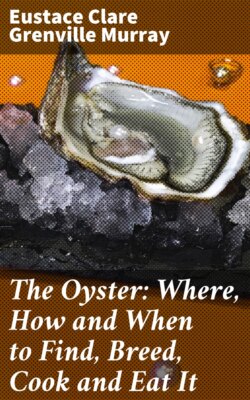Читать книгу The Oyster: Where, How and When to Find, Breed, Cook and Eat It - Eustace Clare Grenville Murray - Страница 5
На сайте Литреса книга снята с продажи.
CHAPTER II.
ANCIENT HISTORY OF THE OYSTER.
ОглавлениеTable of Contents
The Ancients; Oysters a Greek and Roman Luxury; Sergius Orata and the Oyster-beds of Baia; Immense Consumption at Rome; Failure of the Circean and Lucrinian Oyster-beds under Domitian, and Introduction of Rutupians from Britain; Agricola, Constantine, and Helena; Athenian Oysters and Aristides.
Horace, Martial, and Juvenal, Cicero and Seneca, Pliny, Ætius, and the old Greek doctor Oribasius, whom Julian the Apostate delighted to honour, and other men of taste amongst the ancients, have enlarged upon the various qualities of the oyster; and was it not to Sergius Orata that we owe our present oyster-beds; for he it was who introduced layers or stews for oysters at Baia, the Brighton of ancient Rome, as we have them at present. That was in the days when luxury was rampant, and when men of great wealth, like Licinius Crassus, the leviathan slave merchant, rose to the highest honours; for this dealer in human flesh in the boasted land of liberty, served the office of consul along with Pompey the Great, and on one occasion required no less than 10,000 tables to accommodate all his guests. How many barrels of oysters were eaten at that celebrated dinner, the "Ephemerides"—as Plutarch calls "The Times" and "Morning Post" of that day—have omitted to state; but as oysters then took the place that turtle-soup now does at our great City feeds, imagination may busy itself if it likes with the calculation. All we know is, that oysters then fetched very long prices at Rome, as the author of the "Tabella Cibaria" has not failed to tell us; and then, as now, the high price of any luxury of the table was sure to make a liberal supply of it necessary, when a man like Crassus entertained half the city as his guests, to rivet his popularity.
But the Romans had a weakness for the "breedy creatures," as our dear old friend Christopher North calls them in his inimitable "Noctes." In the time of Nero, some sixty years later, the consumption of oysters in the "Imperial City" was nearly as great as it now is in the "World's Metropolis;" and there is a statement, which I recollect to have read somewhere, that during the reign of Domitian, the last of the twelve Cæsars, a greater number of millions of bushels were annually consumed at Rome than I should care to swear to. These oysters, however, were but Mediterranean produce—the small fry of Circe, and the smaller Lucrinians; and this unreasonable demand upon them quite exhausted the beds in that great fly-catcher's reign; and it was not till under the wise administration of Agricola in Britain, when the Romans got their far-famed Rutupians from the shores of Kent, from Richborough and the Reculvers—the Rutupi Portus of the "Itinerary," of which the latter, the Regulbium, near Whitstable, in the mouth of the Thames, was the northern boundary—that Juvenal praised them as he does; and he was right: for in the whole world there are no oysters like them; and of all the "breedy creatures" that glide, or have ever glided down the throats of the human race, our "Natives" are probably the most delectable. Can we wonder, then, when Macrobius tells us that the Roman pontiffs in the fourth century never failed to have these Rutupians at table, particularly, feeling sure that Constantine the Great, and his mother, the pious Helena, must have carried their British tastes with them to Rome at that period.
The Greeks have not said much in praise of oysters; but then they knew nothing of Britain beyond its name, and looked upon it very much in the same light as we now regard the regions of the Esquimaux; and as to the little dabs of watery pulps found in the Mediterranean, what are they but oysters in name? Indeed, the best use the Athenians could make of them was to use their shells to ostracise any good citizen who, like Aristides, was too virtuous for a "Greek." However, on the plea that oysters are oysters, we presume—for it could not be on account of their flavour—"oysters," says the author of the "Tabella Cibaria," "were held in great esteem by the Athenians." No doubt when Constantine moved the seat of the Empire from Rome to Constantinople, he did not forget to have his Rutupians regularly forwarded; so, perhaps, after all it was our "Natives," which thus found their way into Greece, that they delighted in; and if so, the good taste of the Athenians need not be called into question; but, as in literature and the arts, in oyster-eating too, it deserves to be held up to commendation.
